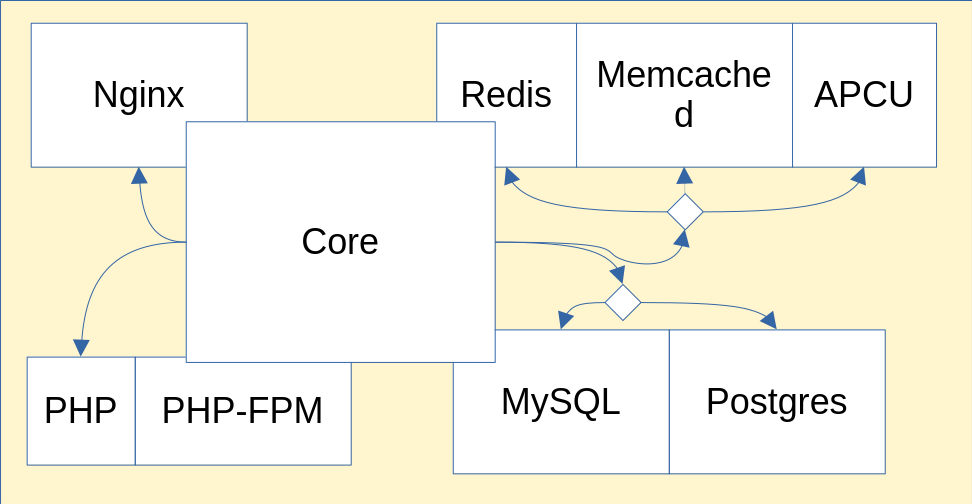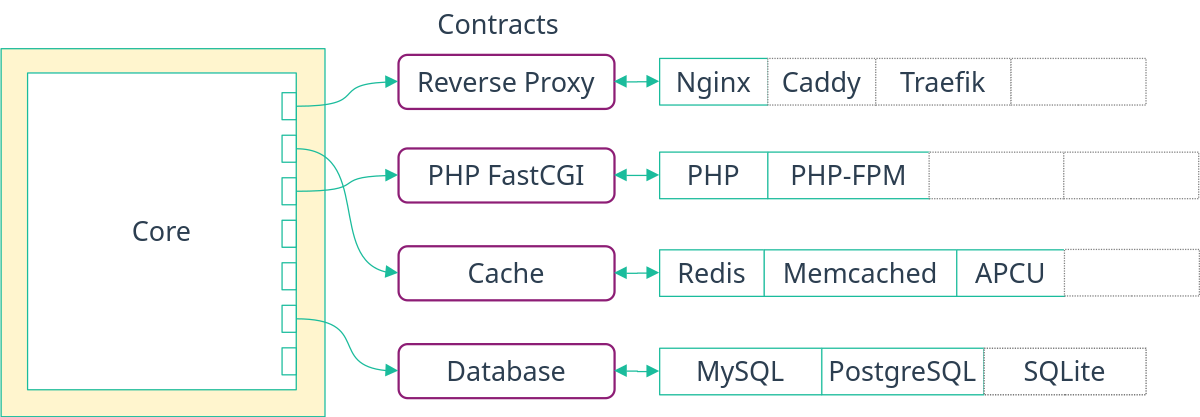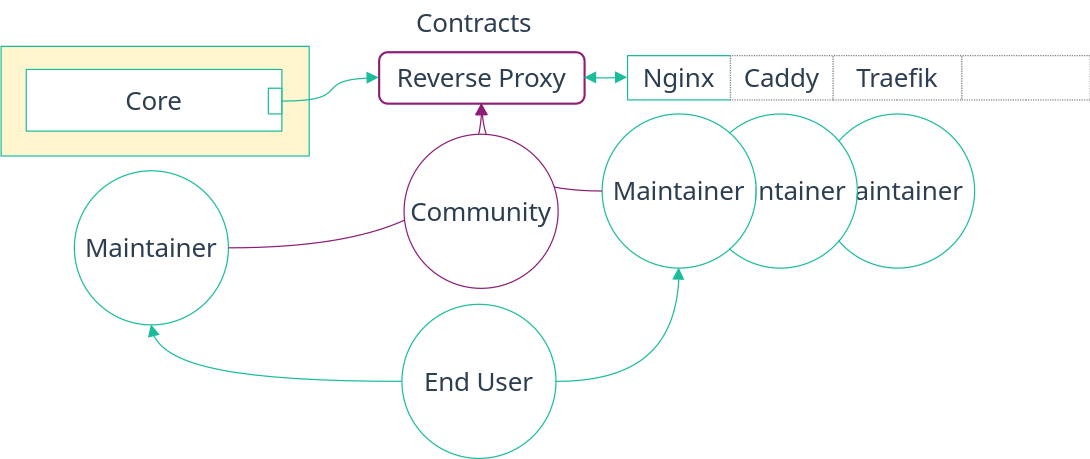Contracts
Table of Contents
Note
An RFC has been created which is the most up-to-date version of contracts. The text here is still relevant although the implementation itself has changed a little bit.
A contract decouples modules that use a functionality from modules that provide it. A first intuition for contracts is they are generally related to accessing a shared resource.
A few examples of contracts are generating SSL certificates, creating a user or knowing which files and folders to backup. Indeed, when generating certificates, the service using those do not care how they were created. They just need to know where the certificate files are located.
A contract is made between a requester module and a provider module.
For example, a backup contract can be made between the Nextcloud service and the Restic service.
The former is the requester - the one wanted to be backed up -
and the latter is the provider of the contract - the one backing up files.
The backup contract would then say which set of options the requester and provider modules
must use to talk to each other.
Provided contracts
Self Host Blocks is a proving ground of contracts. This repository adds a layer on top of services available in nixpkgs to make them work using contracts. In time, we hope to upstream as much of this as possible, reducing the quite thick layer that it is now.
Provided contracts are:
SSL generator contract to generate SSL certificates. Two providers are implemented: self-signed and Let’s Encrypt.
Backup contract to backup directories. Two providers are implemented: BorgBackup and Restic.
Database Backup contract to backup database dumps. One provider is implemented: BorgBackup and Restic.
Contract for Secrets to provide secrets that are deployed outside of the Nix store. One provider is implemented: SOPS.
Dashboard contract to show services in a nice user-facing dashboard. One provider is implemented: Homepage.
Problem Statement
Currently in nixpkgs, every module accessing a shared resource must either implement the logic needed to setup that resource themselves or either instruct the user how to set it up themselves.
For example, this is what the Nextcloud module looks like.
It sets up the nginx module and a database,
letting you choose between multiple databases.

This has a few disadvantages:
I’m using the Nextcloud module to make the following examples more concrete but this applies to all other modules.
This leads to a lot of duplicated code. If the Nextcloud module wants to support a new type of database, the maintainer of the Nextcloud module must do the work. And if another module wants to support it too, the maintainers of that module cannot re-use easily the work of the Nextcloud maintainer, apart from copy-pasting and adapting the code.
This also leads to tight coupling. The code written to integrate Nextcloud with the Nginx reverse proxy is hard to decouple and make generic. Letting the user choose between Nginx and another reverse proxy will require a lot of work.
There is also a lack of separation of concerns. The maintainers of a service must be experts in all implementations they let the users choose from.
This is not extendable. If you, the user of the module, want to use another implementation that is not supported, you are out of luck. You can always dive into the module’s code and extend it with a lot of
mkForce, but that is not an optimal experience.Finally, there is no interoperability. It is not currently possible to integrate the Nextcloud module with an existing database or reverse proxy or other type of shared resource that already exists on a non-NixOS machine.
We do believe that the decoupling contracts provides helps alleviate all the issues outlined above which makes it an essential step towards better interoperability.

Indeed, contracts allow:
Reuse of code. Since the implementation of a contract lives outside of modules using it, using the same implementation and code elsewhere without copy-pasting is trivial.
Loose coupling. Modules that use a contract do not care how they are implemented as long as the implementation follows the behavior outlined by the contract.
Full separation of concerns (see diagram below). Now, each party’s concern is separated with a clear boundary. The maintainer of a module using a contract can be different from the maintainers of the implementation, allowing them to be experts in their own respective fields. But more importantly, the contracts themselves can be created and maintained by the community.
Full extensibility. The final user themselves can choose an implementation, even new custom implementations not available in nixpkgs, without changing existing code.
Incremental adoption. Contracts can help bridge a NixOS system with any non-NixOS one. For that, one can hardcode a requester or provider module to match how the non-NixOS system is configured. The responsibility falls of course on the user to make sure both system agree on the configuration.
Last but not least, Testability. Thanks to NixOS VM test, we can even go one step further by ensuring each implementation of a contract, even custom ones, provides required options and behaves as the contract requires thanks to generic NixOS tests. For an example, see the generic backup contract test and the instantiated NixOS tests ensuring the providers do implement the contract correctly.

Concept
Conceptually, a contract is an attrset of options with a defined behavior.
Let’s take a reduced secret contract as example.
This contract allows a requester module to ask for a secret
and a provider module to generate that secret outside of the nix store
and provide it back to the requester.
In this case, the options for the contract could look like so:
The full secret contract can be found here.
{ lib, ... }:
let
inherit (lib) mkOption;
inherit (lib.types) submodule str;
in
{
# Filled out by the requester module.
request = mkOption {
type = submodule {
options = {
owner = mkOption {
description = "Linux user owning the secret file.";
type = str;
};
};
};
};
# Filled out by the provider module.
result = mkOption {
type = submodule {
options = {
path = mkOption {
description = "Linux user owning the secret file.";
type = str;
};
};
};
};
# Options specific for each provider.
settings = mkOption {
type = submodule {
options = {
encryptedFile = mkOption {
description = "Encrypted file containing the secret.";
type = path;
};
};
};
};
}
Unfortunately, the contract needs to be more complicated to handle several constraints.
First, to fill out the contract, the
requestermust set the defaults for therequest.*options and theproviderfor theresult.*options.Since one cannot do that after calling the
mkOptionfunction, therequestandresultattributes must be functions taking in the defaults as arguments.Another constraint is a
providermodule of a contract will need to work for severalrequestermodules. This means that the option to provide the contract will be anattrsOfof something, not just plainly the contract.Think of a provider for the secret contract, if it didn’t use
attrsOf, one could only create an unique secret for all the modules, which is not useful.Also, one usually want the defaults for the contract to be computed from some other option. For a
providermodule, the options in theresultcould be computed from thenameprovided in theattrsOfor from a value given in therequestorsettingattrset.For example, a
providermodule for thesecretcontract would want something like the following in pseudo code:services.provier = { secret = mkOption { type = attrsOf (submodule ({ name, ... }: { result = { path = mkOption { type = str; default = "/run/secrets/${name}"; }; }; })) }; };Another example is for a
providermodule for thebackupcontract which would want the name of the restore script to depend on the path to the repository it is backing up to. This is necessary to differentiate which source to restore from in case one wants to backup a samerequesterservice to multiple different repositories. One could be local and another remote, for example.services.provider = { backup = mkOption { type = attrsOf (submodule ({ name, config, ... }: { settings = { }; result = { restoreScript = { type = str; default = "provider-restore-${name}-${config.settings.repository.path}"; }; }; })); }; };Finally, the last constraint, which is also the more demanding, is we want to generate the documentation for the options with
nixos-generate-config. For that, the complicateddefaultwe give to options that depend on other options break the documentation generation. So instead of using onlydefault, we must also definedefaultTextattributes.This means the actual
mkRequestandmkResultfunctions must take twice as many arguments as there are option. One for thedefaultand the other for thedefaultText. This will not be shown in the following snippets as it is already complicated enough.
These are all the justifications to why the final contract structure is as presented in the next section. It makes it harder to write, but much easier to use, which is nice property.
Schema
A contract for a version of the backup contract with less options would look like so:
{ lib, ... }:
let
inherit (lib) mkOption;
inherit (lib.types) submodule str;
in
{
mkRequest =
{ owner ? "root",
}: mkOption {
default = {
inherit owner;
};
type = submodule {
options = {
owner = mkOption {
description = "Linux user owning the secret file.";
type = str;
default = owner;
};
};
};
};
mkResult =
{ path ? "/run/secrets/secret",
}: mkOption {
type = submodule {
options = {
path = mkOption {
description = "Linux user owning the secret file.";
type = str;
default = path;
};
};
};
};
}
Assuming the services.requester module needs to receive a password from the user
and wants to use the secret contract for that,
it would then setup the option like so:
{ pkgs, lib, ... }:
let
inherit (lib) mkOption;
inherit (lib.types) submodule;
contracts = pkgs.callPackage ./modules/contracts {};
mkRequester = requestCfg: {
request = contracts.secret.mkRequest requestCfg;
result = contracts.secret.mkResult {};
};
in
{
options.services.requester = {
password = mkOption {
description = "Password for the service.";
type = submodule {
options = mkRequester {
owner = "requester";
};
};
};
};
config = {
// Use config.services.requester.password.result.path
};
}
A provider that can create multiple secrets would have an attrsOf option
and use the contract in it like so:
let
inherit (lib) mkOption;
inherit (lib.types) attrsOf submodule;
contracts = pkgs.callPackage ./modules/contracts {};
mkProvider =
module:
{ resultCfg,
settings ? {},
}: {
request = contracts.secret.mkRequest {};
result = contracts.secret.mkResult resultCfg;
} // optionalAttrs (settings != {}) { inherit settings; };
in
{
options.services.provider = {
secrets = mkOption {
type = attrsOf (submodule ({ name, options, ... }: {
options = mkProvider {
resultCfg = {
path = "/run/secrets/${name}";
};
settings = mkOption {
description = "Settings specific to the Sops provider.";
type = attrsOf (submodule {
options = {
repository = mkOption {
};
};
});
default = {};
};
};
}));
};
};
}
The mkRequester and mkProvider are provided by Self Host Blocks
as they are generic, so the actual syntax is a little bit different.
They were copied here that way so the snippets were self-contained.
To see a full contract in action, the secret contract is a good example. It is composed of:
Contract Tests
To make sure all providers module of a contract have the same behavior, generic NixOS VM tests exist per contract. They are generic because they work on any module, as long as the module implements the contract of course.
A simplified test for a secret contract would look like the following. First, there is the generic test:
{ pkgs, lib, shb, ... }:
let
inherit (lib) getAttrFromPath setAttrByPath;
in
{ name,
configRoot,
settingsCfg,
modules ? [],
owner ? "root",
content ? "secretPasswordA",
}: shb.test.runNixOSTest {
inherit name;
nodes.machine = { config, ... }: {
imports = modules;
config = setAttrByPath configRoot {
secretA = {
request = {
inherit owner;
};
settings = settingsCfg content;
};
};
};
testScript = { nodes, ... }:
let
result = (getAttrFromPath configRoot nodes.machine)."A".result;
in
''
owner = machine.succeed("stat -c '%U' ${result.path}").strip()
if owner != "${owner}":
raise Exception(f"Owner should be '${owner}' but got '{owner}'")
content = machine.succeed("cat ${result.path}").strip()
if content != "${content}":
raise Exception(f"Content should be '${content}' but got '{content}'")
'';
}
This test is generic because it sets the request on an option
whose path is not yet known.
It achieves this by calling setAttrByPath configRoot where configRoot
is a path to a module, for example [ "services" "provider" ] for a module
whose root option is under services.provider.
This test validates multiple aspects of the contract:
The provider must understand the options of the
request. Hererequest.owner.The provider correctly provides the expected result. Here the location of the secret in the
result.pathoption.The provider must behave as expected. Here, the secret located at
result.pathmust have the correctownerand the correctcontent.
Instantiating the test for a given provider looks like so:
{
hardcoded_root = contracts.test.secret {
name = "hardcoded_root";
modules = [ ./modules/blocks/hardcodedsecret.nix ];
configRoot = [ "shb" "hardcodedsecret" ];
settingsCfg = secret: {
content = secret;
};
};
hardcoded_user = contracts.test.secret {
name = "hardcoded_user";
owner = "user";
modules = [ ./modules/blocks/hardcodedsecret.nix ];
configRoot = [ "shb" "hardcodedsecret" ];
settingsCfg = secret: {
content = secret;
};
};
}
Validating a new provider is then just a matter of extending the above snippet.
To see a full contract test in action, the test for backup contract is a good example. It is composed of:
the generic test
and instantiated tests for some providers.
Videos
Two videos exist of me presenting the topic, the first at NixCon North America in spring of 2024 and the second at NixCon in Berlin in fall of 2024.
Are there contracts in nixpkgs already?
Actually not quite, but close. There are some ubiquitous options in nixpkgs. Those I found are:
services.<name>.enableservices.<name>.packageservices.<name>.openFirewallservices.<name>.userservices.<name>.group
What makes those nearly contracts are:
Pretty much every service provides them.
Users of a service expects them to exist and expects a consistent type and behavior from them. Indeed, everyone knows what happens if you set
enable = true.Maintainers of a service knows that users expects those options. They also know what behavior the user expects when setting those options.
The name of the options is the same everywhere.
The only thing missing to make these explicit contracts is, well, the contracts themselves. Currently, they are conventions and not contracts.